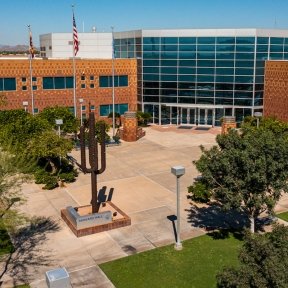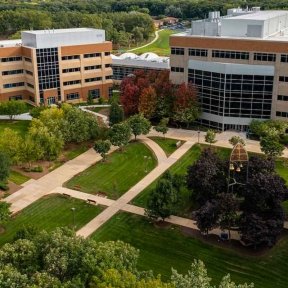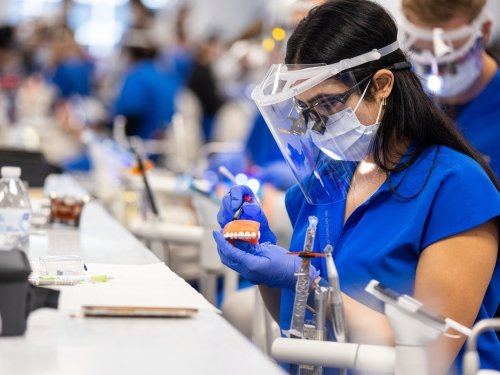Dental Medicine
Experience expert guidance from caring faculty, advanced technology integration across classes, labs, and the dental clinic, all while contributing to patient-centered, ethical, and evidence-based oral care in MWU's Dental Medicine program.

AZ - Glendale
- In-Person
College College of Dental Medicine-Arizona
Duration4 years
Class Size Approximation145

IL - Downers Grove
- In-Person
College College of Dental Medicine-Illinois
Duration4 years
Class Size Approximation140
The Midwestern Advantage
Midwestern University's investment in education, faculty, research, facilities, and clinical training translates into our students being "Day One Ready.”
Our dental medicine program focuses on integrated, case-based learning, covering basic sciences, preclinical oral health sciences, and patient-based clinical dentistry, all supported by scientific evidence. Additional courses in multicultural healthcare, ethics, professionalism, practice management, advanced clinical dentistry, and community service enrich the core curriculum.
Key areas include:
- Basic, behavioral, and clinical sciences
- Preclinical simulation studies
- Practical clinical dentistry
- Community clinical rotations
View program details in our Academic Catalog*
*Subject to change
At Midwestern University, we prioritize research to advance knowledge and offer students enhanced learning opportunities, fostering close collaboration with faculty researchers and peers on innovative projects.
Explore a world of diverse and rewarding career opportunities with a Doctor of Dental Medicine degree. From private practice and specialty dentistry to academia and research, your programs will help you unleash your potential to make a lasting impact on oral health and overall well-being. Some career opportunities include:
- General dental practice
- Graduate education in any of the dental specialties
- Armed services (military)
- Public Health Service or Indian Health Service
- Dental industry
- Dental education
- Dental administration
As a doctor of dental medicine (D.M.D.), you are trained to diagnose and treat diseases, injuries, and malformations of the teeth and tissues in the mouth, and to give advice and provide care to help prevent future problems. You help patients learn to take good care of their teeth and gums as part of overall good health. In addition, you extract or repair damaged teeth, remove tooth decay and fill cavities, examine x-rays, perform corrective surgery, and make models to replace missing teeth. Increasingly, you provide care and instruction aimed at preventing tooth loss, rather than simply providing treatments such as fillings.
While nearly 80 percent of dental medicine practitioners are general dentists, additional experience, training, and education beyond the D.M.D. (or D.D.S.) degree can lead to opportunities in teaching, research, or one of the nine recognized specialty practice areas: Endodontics, Oral and Maxillofacial Pathology, Oral and Maxillofacial Radiology, Oral and Maxillofacial Surgery, Oral Medicine, Orofacial Pain, Orthodontics and Dentofacial Orthopedics, Pediatric Dentistry, Periodontics, Prosthodontics, Dental Anesthesiology, and Dental Public Health.
To prepare for a career in dental medicine, your pre-professional education should include courses in biology, organic and inorganic chemistry, physics, health, and mathematics. For admission, most professional schools of dental medicine require a bachelor's degree, often in a science-related subject, as well as recommendations, evidence of community involvement, and a personal interview.
In the first two years of your professional education, your dental medicine classroom instruction and laboratory work emphasizes anatomy, microbiology, biochemistry, physiology, clinical sciences, and laboratory techniques. During the last two years, you will treat patients under the supervision of licensed dentists. Licensure is required for professional dental practice.
The U.S. Bureau of Labor Statistics expects opportunities for dentists to grow four percent from 2022 to 2032, about as fast as the average for all occupations. The demand for dental services is expected to increase with overall population growth and a larger number of older Americans who, having retained their teeth longer than previous generations, will require more — and more complicated — dental care. Most opportunities will result from the need to replace the significant number of dentists expected to retire, as new dentists take over these established practices or start their own.
Because nearly all dentists are in private practice, your interest in entrepreneurial business is important to success. You will be responsible for business operations, equipment and supplies, recordkeeping and finances, and the potential of hiring employees. Many of your peers enjoy professional practice as socially conscious, creative, talented, civic-minded professionals who improve patients' quality of life and appearance while working with community leaders and other health professionals to promote good health for all.
According to the American Dental Association (ADA):
- Advancements in dental technology such as digital radiography, laser systems, and informatics will allow dentists to provide more effective treatments and to practice more effectively.
- In addition to private practice, new dentists will be needed in teaching, research, and public health dentistry.
- Dentists provide services to populations abroad and work for agencies such as the World Health Organization (WHO), the United Nations Educational, Scientific, and Cultural Organization (UNESCO), and the Food and Agricultural Organization of the United Nations (FAO). Many volunteer to bring dentistry to aid people in developing countries.
If you are the type of person who has a good visual memory, excellent judgment regarding space, shape, and color, a high degree of manual dexterity, scientific aptitude, business sense, self-discipline, and communication skills, and you enjoy knowing a diverse range of people from different backgrounds, a career in dental medicine may be just right for you.
Academic Course Catalog
Explore comprehensive details about our academic programs (subject to change).
Career Placement & Salaries
Campus Options


Glendale
Located just 15 minutes from downtown Phoenix. Students can study and live on our sprawling 143-acre campus and practice at our University-owned clinics located just across the street.


Downers Grove
Located just 25 miles west of Chicago. Students can study and live in the comfort and safety of a 105-acre campus in the suburbs and can practice at our University-owned clinics located just 10 minutes away.

